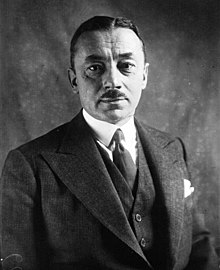Reynaud
| Paul Reynaud | |
|---|---|

Paul Reynaud (1933)
|
|
| 77th Prime Minister of France | |
|
In office 21 March 1940 – 16 June 1940 |
|
| President | Albert Lebrun |
| Preceded by | Édouard Daladier |
| Succeeded by | Philippe Pétain |
| Deputy Prime Minister of France | |
|
In office 28 June 1953 – 12 June 1954 |
|
| Preceded by | Henri Queuille |
| Succeeded by | Guy Mollet |
|
In office 20 February 1932 – 10 May 1932 |
|
| Preceded by | Lucien Hubert |
| Succeeded by | Albert Dalimier |
| Minister responsible for Relations with Partner States and the Far East | |
|
In office 2 July 1950 – 4 July 1950 |
|
| Preceded by | Position established |
| Succeeded by | Jean Letourneau |
| Minister of Finance and Economic Affairs | |
|
In office 26 July 1948 – 28 August 1948 |
|
| Preceded by | René Mayer |
| Succeeded by | Christian Pineau |
| Minister of Foreign Affairs | |
|
In office 5 June 1940 – 16 June 1940 |
|
| Preceded by | Édouard Daladier |
| Succeeded by | Philippe Pétain |
|
In office 21 March 1940 – 18 May 1940 |
|
| Preceded by | Édouard Daladier |
| Succeeded by | Édouard Daladier |
| Minister of National Defence and War | |
|
In office 18 May 1940 – 16 June 1940 |
|
| Preceded by | Édouard Daladier |
| Succeeded by | Maxime Weygand |
| Minister of Finance | |
|
In office 1 November 1938 – 21 March 1940 |
|
| Preceded by | Paul Marchandeau |
| Succeeded by | Lucien Lamoureux |
|
In office 2 March 1930 – 4 December 1930 |
|
| Preceded by | Charles Dumont |
| Succeeded by | Louis Germain-Martin |
| Minister of Justice | |
|
In office 12 April 1938 – 1 November 1938 |
|
| Preceded by | Marc Rucart |
| Succeeded by | Paul Marchandeau |
|
In office 20 February 1932 – 3 June 1932 |
|
| Preceded by | Léon Bérard |
| Succeeded by | René Renoult |
| Minister of the Colonies | |
|
In office 27 February 1931 – 6 February 1932 |
|
| Preceded by | Théodore Steeg |
| Succeeded by | Louis de Chappedelaine |
| Personal details | |
| Born |
Jean Paul Reynaud 15 October 1878 Barcelonnette, France |
| Died | 21 September 1966 (aged 87) Neuilly-sur-Seine, France |
| Political party |
Democratic Republican Alliance (1901–1949) National Centre of Independents and Peasants (1949–1966) |
| Spouse(s) | Jeanne Henri-Robert (1912–1913) Christiane Mabire (1949–1966) |
| Children | Colette Serge Evelyne Alexandre |
| Alma mater | HEC Paris |
Paul Reynaud (French: [pɔl ʁɛjno]; 15 October 1878 – 21 September 1966) was a French politician and lawyer prominent in the interwar period, noted for his stances on economic liberalism and militant opposition to Germany.
After the outbreak of World War II Reynaud became the penultimate Prime Minister of the Third Republic in March 1940. He was also vice-president of the Democratic Republican Alliance center-right party. Reynaud was Prime Minister during the German defeat of France in May and June 1940; he persistently refused to support an armistice with Germany and resigned on 16 June. After unsuccessfully attempting to flee France, he was arrested by Philippe Petain's administration. Surrendered to German custody in 1942, he was imprisoned in Germany and later Austria until liberation in 1945.
Elected to the Chamber of Deputies in 1946, he became a prominent figure again in French political life, serving in several cabinet positions. He favoured a United States of Europe, and participated in drafting the constitution for the Fifth Republic, but resigned from government in 1962 after disagreement with President de Gaulle over changes to the electoral system.
Reynaud was born in Barcelonnette, Alpes-de-Haute-Provence. His father had made a fortune in the textile industry, enabling Reynaud to study law at the Sorbonne. He entered politics and was elected to the French Chamber of Deputies from 1919 to 1924, representing Basses-Alpes, and again from 1928, representing a Paris district. Although he was first elected as part of the conservative "Blue Horizon" bloc in 1919, Reynaud shortly thereafter switched his allegiance to the centre-right Democratic Republican Alliance party, later becoming its vice-president.
...
Wikipedia
